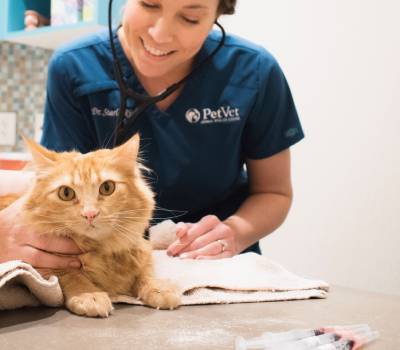
Easy and Effective Disease Prevention
Keeping your pet’s vaccinations up to date is an important part of maintaining their good health. While the number of diseases we recommend vaccinating your pet for is actually pretty small, they are generally diseases that can result in severe illness, or death. So, keeping those vaccinations up to date should be a priority.
Below, you will find a list of our recommended vaccinations for both dogs and cats.
Core vaccines are those that we (and the veterinary community in general) recommend for all dogs (or cats). They protect your pet from common, serious, and potentially fatal, diseases that are easily acquired either from the environment or from other animals.
Non-core vaccines are those that we recommend based on your pet’s lifestyle, environment, or other factors. They also focus on common, easily acquired, diseases, but often diseases that are less serious (not likely fatal) or only likely to be acquired under certain conditions.
If you have any questions about our vaccine recommendations, please feel free to talk to us about that during your pet’s appointment.

Core dog vaccinations include:
- DA2PPv (distemper, adenovirus, parainfluenza and parvovirus)
- Rabies
- Leptospirosis
Non-core vaccines include:
- Bordetella (kennel cough) for dogs who often visit boarding facilities, groomers, or dog parks.
- Influenza (H3N8 and H3N2), also for dogs that visit boarding facilities, groomers, or dog parks.

Core cat vaccines include:
- FVRCP (feline viral rhinotracheitis, calicivirus, and panleukopenia)
- PureVax® Rabies vaccine
Non-core cat vaccines include:
- PureVax® Feline leukemia vaccine (FeLV), suggested for all kittens and some adult cats, particularly those who spend any time outdoors.
PureVax® vaccines are adjuvant free and may help reduce the risk of Feline Injection Site Sarcoma.
If you recently adopted a cat or kitten from a shelter and are unsure of their medical history, we offer screenings for feline leukemia virus (FeLV) and feline immunodeficiency virus (FIV). Knowing what your kitten has been exposed to not only helps us care for them, but protects other cats in your household who would be susceptible.
